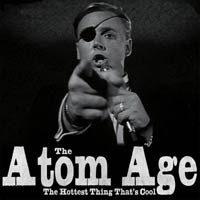
The Atom Age
The Hottest Thing That's Cool (2012)
John Gentile
The Atom Age makes no bones about what it is here to do: rock. Heavily influenced by the more wild end of '60s garage rock, Rocket from the Crypt and '50s boppers, on second album The Hottest Thing That's Cool, the members don't so much try to distinguish themselves from their inspirations as blow them up into loving caricatures.
Across the album's 11 tracks, the band bashes out hooky riff after hooky riff, keeps the drums flying and shouts out odes to partying and depression, all while a whacky sax flies around the background. Most noticeably, the band isn't playing "garage rock" so much as it is playing a modern impression of it. Like spiritual mentors Rocket from the Crypt, the music is far too wild and reckless to have actually been recorded in the '60s, but since the band confines itself to simple, thumb-snapping riffs, the spirit, energy and excitement overshadow (unnecessary) technical perfection.
Perhaps what sets the band apart from contemporaries is the bluesy sax perpetually wailing in the background. While woodwinds can get monotonous in rock music, the sax gels with the white noise wall of sound of the band, and gives both a deeper texture as well as a more vicious, but swinging sound. The sax maintains its muddy but powerful strokes, at times referencing Steve MacKaye of the Stooges, King Curtis and even the spacier exploration of Hawkwind's "You Shouldn't Do That."
But to say that the band is merely a throwback to garage rock or RFTC wouldn't be an accurate description. While that's clearly where the band bases its sound, at times the players step on the accelerator to rock as hard as Mötörhead ("Cut, Paste, Kill") while other times they really pull out the riffs to swing like George Thorogood. ("I've Been Thinking")
While the music maintains a perpetually energetic, optimistic sound, the lyrics tend to create an interesting contrast by dipping into the more macabre. "I Hypnotize" suggests controlling others with a malicious intent in order to maintain a facade of lies. "Nothing Ever Changes" laments ennui. "Dead Wrong," which nearly starts with a Rudimentary Peni riff, accepts a life of perpetual bad luck.
Yet, it seems that this is where the band doesn't quite make the connection. The darker lyrics, which at times seem to be tongue and cheek and sometimes dead serious, are somewhat hampered by the band's singular tempo. The group plays either fast or really fast. In doing so, they maintain a youthful energy, but have difficulty lending distinction to their weirder and more sinister lyrics.
No doubt, this album rocks and thankfully breaks the current monotony that punk either has to be calm and self-reflective or throat shredding screaming. The band is advancing. It will just be interesting to see if they can advance their muscular rock while appealing to a deeper well.